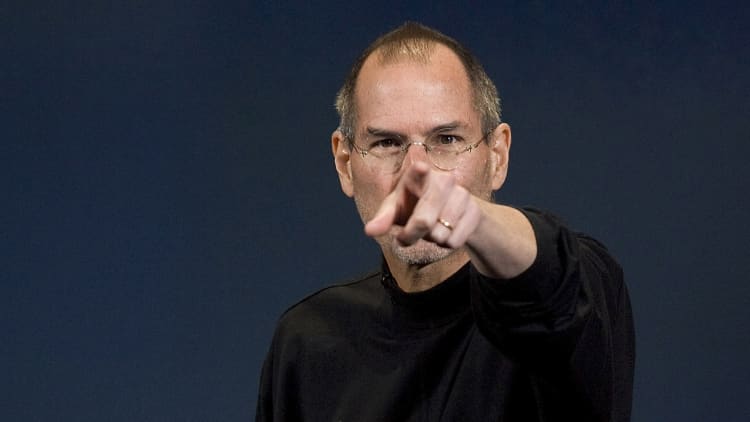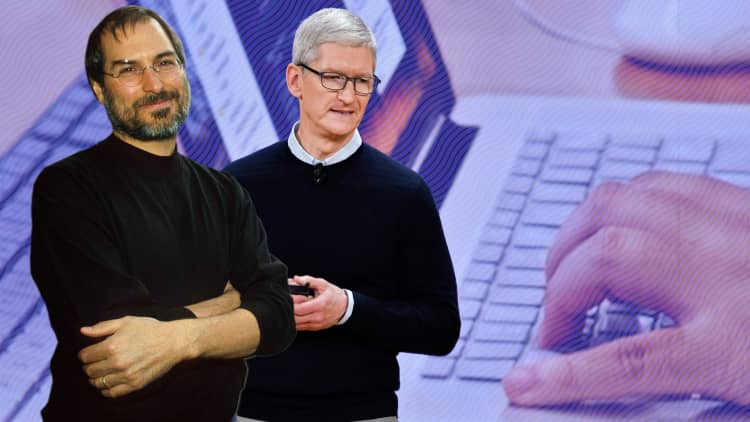On paper, Tim Cook is an unlikely candidate to be the leading activist CEO in America. A son of the South from a deep red state, he is white and working class. He studied no-nonsense subjects like engineering and business.
His predecessor Steve Jobs appeared far more liberal. A scion of moderate California, Jobs in his earlier days had long hair, dressed like a hippie, dated a rock star and was a vegetarian. He loved Bob Dylan and lived on a commune.
Without a doubt, Jobs was brilliant. And he would have been a far more likely candidate to turn Apple into one of the country's biggest progressive companies. But there's the rub. Apple under Jobs always had a reputation as a liberal company, but it wasn't particularly liberal in its actions. It was a Fortune 500 killing machine. It dodged taxes and made no visible donations.
Cook, on the other hand, is his own man — a genius in his own right and seriously underrated.
Apple under Cook is different
Cook has proven that he is an ethical man, and his values have become an integral part of the company's operation. He is pushing Apple and the entire tech industry forward, making ethical transformations.
While the tech giant has been accused of ethical lapses, worker exploitation and planned product obsolescence, its stances on issues like privacy, the environment and charity are in contrast to its rivals in Silicon Valley and elsewhere.
After the massive fire at Notre Dame Cathedral in Paris, for instance, Cook announced that Apple would be contributing to the restoration.
But the Notre Dame donation is just one small part of Apple's charitable efforts under Cook. Ever since he took over Job's role of CEO in 2011, Apple has donated hundreds of millions to causes such as disaster relief, educational support programs and health and human rights organizations.
Jobs, for the most part, was tightfisted when it came to charity, and it's unlikely that he would have supported Cook's charitable efforts. Despite having amassed a personal fortune — about $7 billion at the time of his death in October 2011, according to Forbes — he did not have a massive reputation for donating to charity.
He even declined to sign the Giving Pledge, the organization founded by Warren Buffett and Bill Gates to convince high-worth individuals to promise to give away half of their net worth to charity.
Jobs' history of giving remains a mystery
It's possible that Jobs may have donated in private, which would align with his secretive nature. There has long been speculation that he donated to medical causes. And, under Jobs, Apple joined Bono's PRODUCT(RED) effort, which donates a portion of RED-branded product sales to the fight against HIV and AIDS in Africa.

Jobs reportedly said that the best thing he could do for charity was increase Apple's share price so that shareholders would be enriched and could donate themselves.
When he returned to Apple in 1997 (after being fired by the board a dozen years earlier), Jobs cancelled all of the company's charitable programs that were implemented in his absence.
It was probably a wise move. Apple was weeks from bankruptcy and needed every penny it could get. But despite growing profits and making $108 billion in revenues in the year he passed away, Apple's charitable programs were never restored — until Cook took command.
Doing good while doing well
One of the first things Cook did after becoming CEO was institute a program in which Apple would match donations of up to $10,000 per employee per year. The company and its employees donated $2.6 million in the first two months of the program. Apple also donated $50 million to Stanford's hospitals, where Jobs had received treatment for his cancer.
If people should have values, then by extension a company should have values.Tim CookCEO, Apple
The company hasn't released any new numbers regarding employee donations, so the amount raised since Cook took over remains unknown. But in 2018, after the Trump administration adjusted U.S. tax laws to allow Apple to repatriate almost $250 billion of overseas cash, Cook announced that the amount of matching donations would be doubled at a rate of two to one instead of one to one.
Cook took Apple to the next level
Cook was right when he said that the best companies in America are the most diverse, and Apple is on its way to having a more diverse workforce. Progress may be slow, but it was encouraging to hear that in 2017, half of Apple's new hires in the U.S. were from underrepresented groups in tech.
As Cook once said, "I don't think business should only deal in commercial things. Business to me is nothing more than a collection of people. If people should have values, then by extension a company should have values."
And though Apple has become the world's fist trillion-dollar company under his leadership, Cook has done so much more by proving the old adage that it's possible to do good while also doing well.
Leander Kahney is the editor of Cult of Mac and best-selling author of "Jony Ive: The Genius Behind Apple's Greatest Products" and "Inside Steve's Brain." His latest book, "Tim Cook: The Genius who took Apple to the Next Level," is out now.
Like this story? Subscribe to CNBC Make It on YouTube!
Don't miss:




